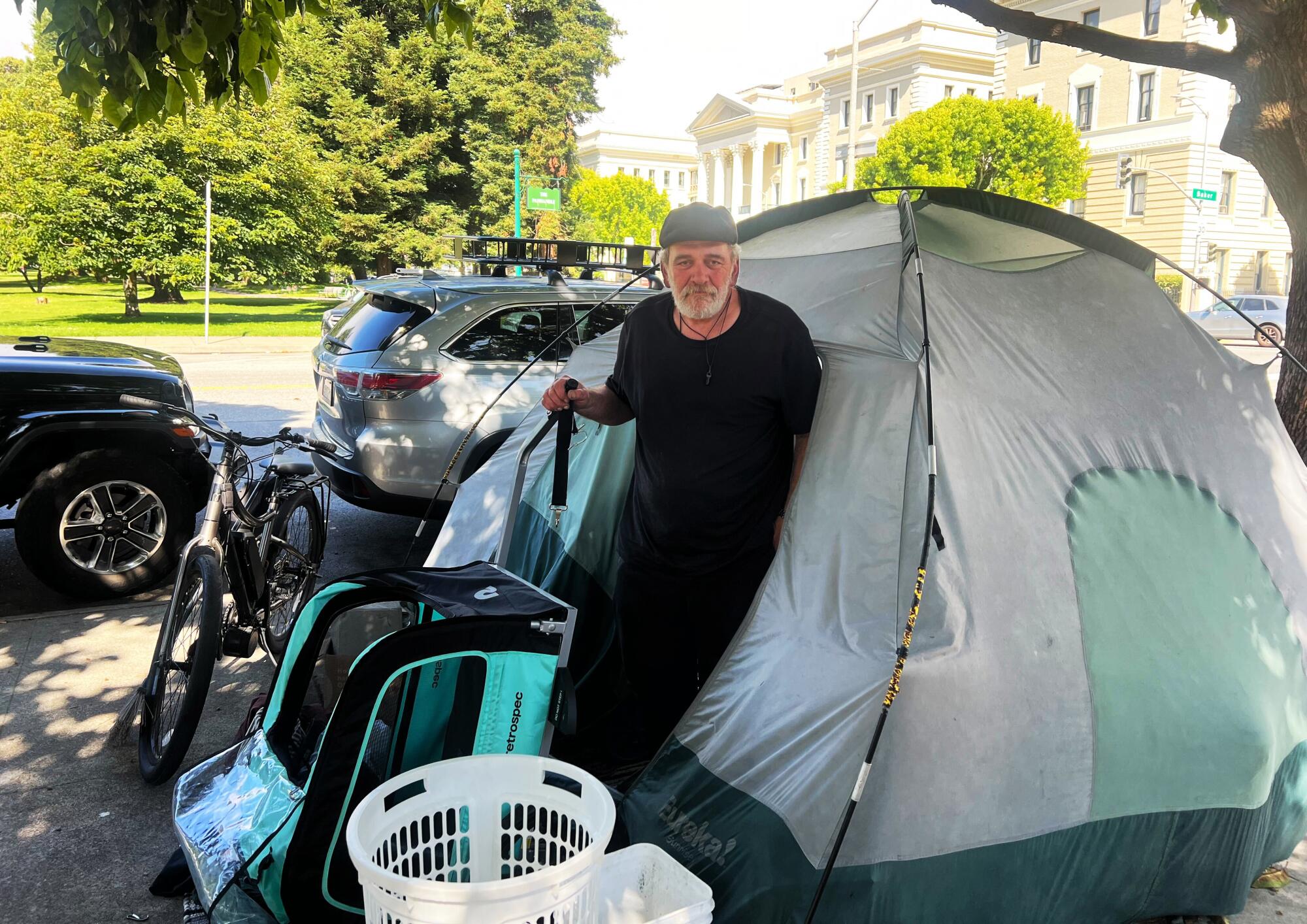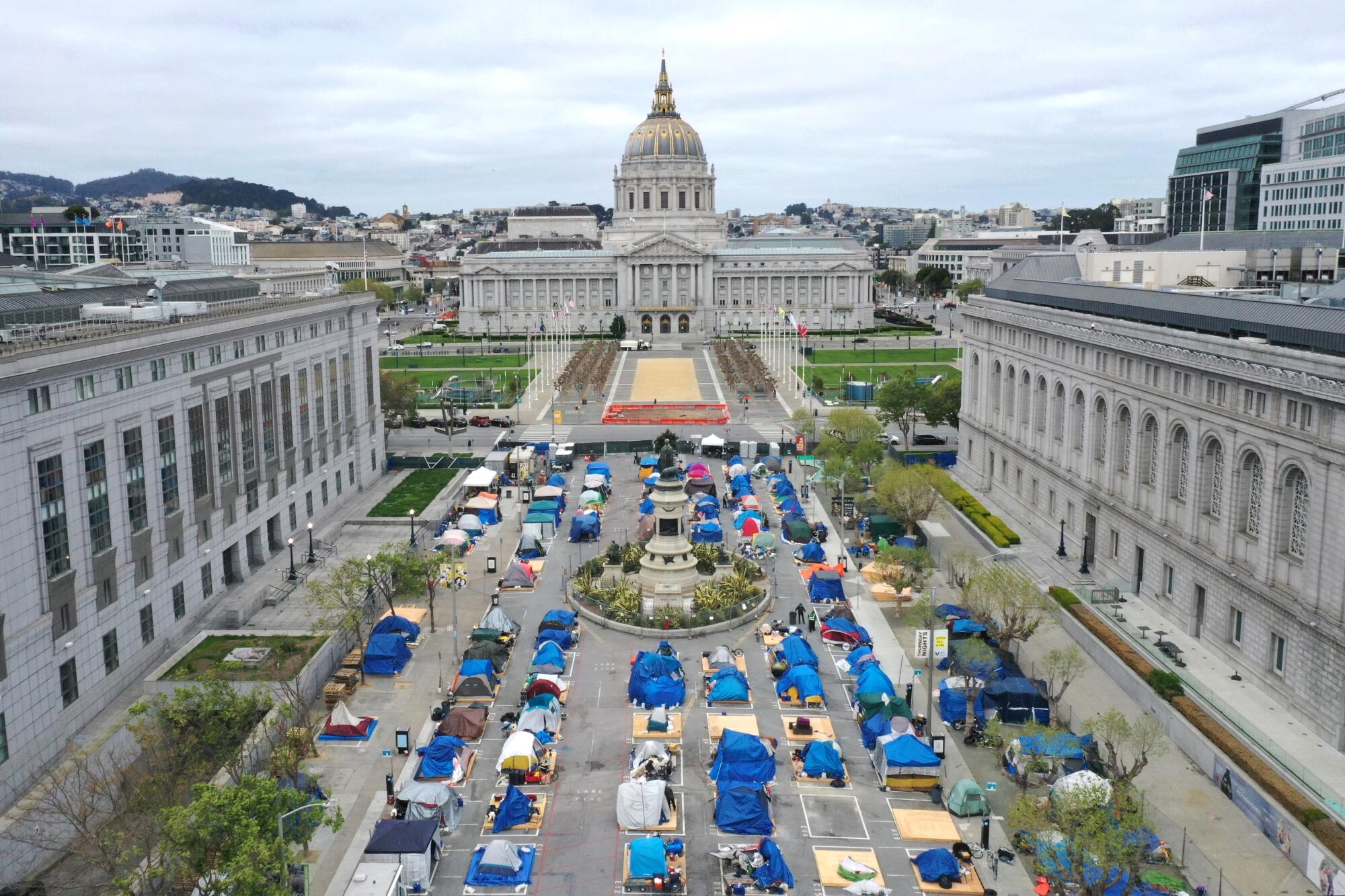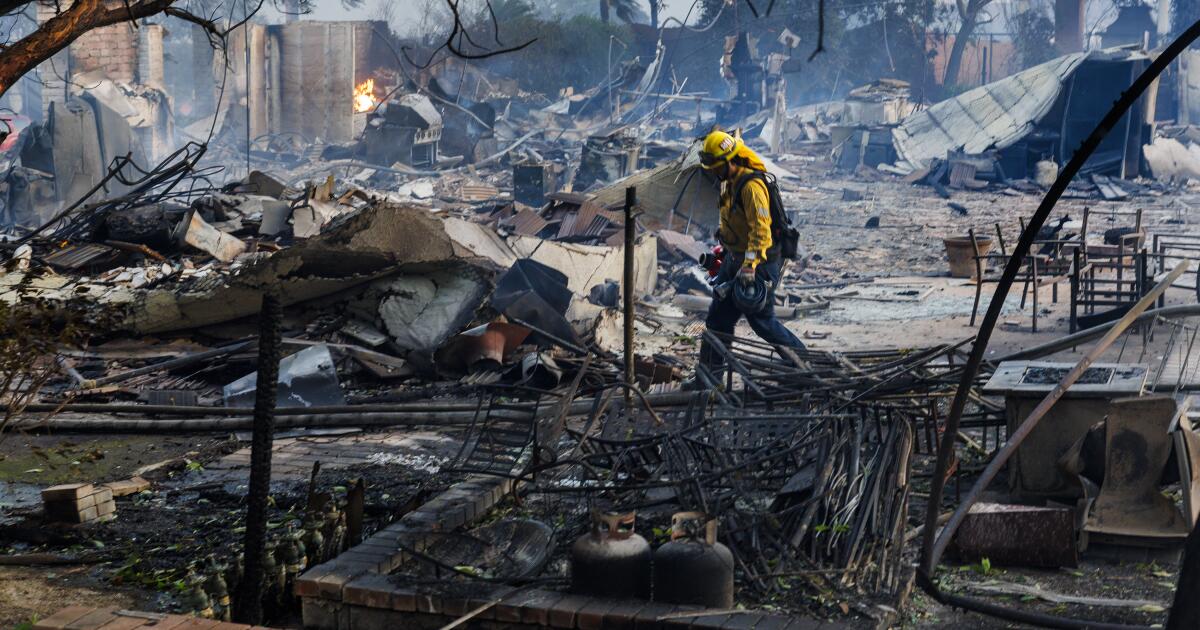
James Reem has been living in a tent on the corner of Fell and Baker streets for more than a year. An artist by trade, he said he was evicted from his apartment after problems with his landlord and lived for a time in a van. After the van was towed, someone gave him a tent and he ended up on the streets.
His tent is pitched outside the city’s only DMV office, across from the Panhandle, a lush strip of greenery that opens to Golden Gate Park in a family-friendly neighborhood adorned with rows of well-kept Victorian homes.
It’s a comfortable place, said Reem, 59, with a sidewalk wide enough to accommodate her tent while still allowing room for pedestrians. Some days, Reem is one of a dozen or more tent dwellers on the concrete stretch.
“There are a few of us who stick together,” Reem said.

“They don’t care about the homeless,” James Reem said of San Francisco’s plans to clear the encampments. “They’re worried about getting rid of us.”
(Hannah Wiley/Los Angeles Times)
His adopted neighborhood is among dozens of sites likely to be targeted as the city launches what Mayor London Breed called an aggressive campaign to force people off the streets in response to a June ruling by the U.S. Supreme Court.
An estimated 8,300 people are homeless in San Francisco. And despite years of efforts to relocate people to temporary shelters or permanent housing, unauthorized encampments remain a widespread and visible problem, often accompanied by trash, theft and open drug use.
For years, Breed and other city officials have said their hands were tied by rulings by the U.S. Court of Appeals for the Ninth Circuit, which covers many Western states, that considered it cruel and unusual punishment to penalize someone for sleeping rough if no legal shelter was available.
The U.S. Supreme Court overturned that decision in a landmark June 28 ruling, saying cities in California and the West can enforce laws restricting homeless encampments on sidewalks and other public property.
On Thursday, citing that decision, Democratic Gov. Gavin Newsom issued an executive order requiring state agencies to remove encampments in their jurisdictions. While the directive does not require cities to follow suit, Newsom urged them to do so, calling the proliferation of encampments a health and safety hazard that requires immediate action.
Breed, another Democrat, also welcomed the ruling. She said last week that with the Supreme Court’s decision, she would take “very aggressive” action to clear homeless encampments starting in August. She added that that action could include criminal penalties for refusing to disperse.
Breed was not available for an interview Friday, and her office has not yet provided details on what the operation will entail or where people living in tents are expected to be relocated. Her spokesman, Jeff Cretan, said some of those details would be worked out next week.
At a mayoral debate hosted by the local firefighters union on July 18, Breed acknowledged that his decision to conduct sweeps was “not popular” but said it was a necessary step.
“We had to move from a compassionate city to a responsible city,” she said. “And I led the effort to make sure we approached this problem differently than we had before.”
She said the city has worked in recent years to add shelter beds and distribute outreach workers to provide services and support. But even when outreach workers offer shelter, the mayor’s office says those offers are rejected nearly 70 percent of the time.

San Francisco has experimented with licensed tent cities in an attempt to address the needs of its homeless population.
(Carolyn Cole/Los Angeles Times)
Breed’s crackdown is likely to generate headlines in San Francisco that contradict narratives peddled by conservative pundits as Vice President Kamala Harris ramps up her presidential campaign. Her Republican opponents have long tried to paint Harris, who rose to political power in 2004 as San Francisco’s elected district attorney, as a California liberal whose policies contributed to the rise in homelessness and retail crime that plague her home state.
But the Supreme Court’s decision has divided local Democratic leaders in California. Left-leaning Democrats, including Los Angeles Mayor Karen Bass, say the decision will allow cities to criminalize homelessness without doing anything to address the root causes of the problem, including drug addiction and a shortage of affordable housing. That sentiment is echoed by homeless advocates.
“This order will not reduce homelessness or discourage encampments, but it will leave vulnerable people further from home and their health than they are today,” Sharon Rapport, state policy director for the Corporation for Supportive Housing, said in an emailed statement.
It’s unclear whether San Francisco has enough shelter beds to accommodate the potential wave of people forced off the streets. Since Breed took office, the city has increased the number of shelter beds from about 2,500 to nearly 4,000, his office said, and expanded the number of permanent assisted living units to about 14,000.
The DMV encampment where Reem lives is one of several that city officials have repeatedly evacuated, only to see it reappear days later. So far this year, the encampment has been evacuated more than a dozen times, according to the mayor’s office.
Reem said he feels safer outside than in an emergency shelter, where he fears his belongings will be stolen. He said he would accept help from city workers. But he also said he thinks Breed’s plan is less about helping people like him than it is about getting rid of tents that make the public uncomfortable.
“They don’t care about the homeless,” he said. “They want to get rid of us.”

